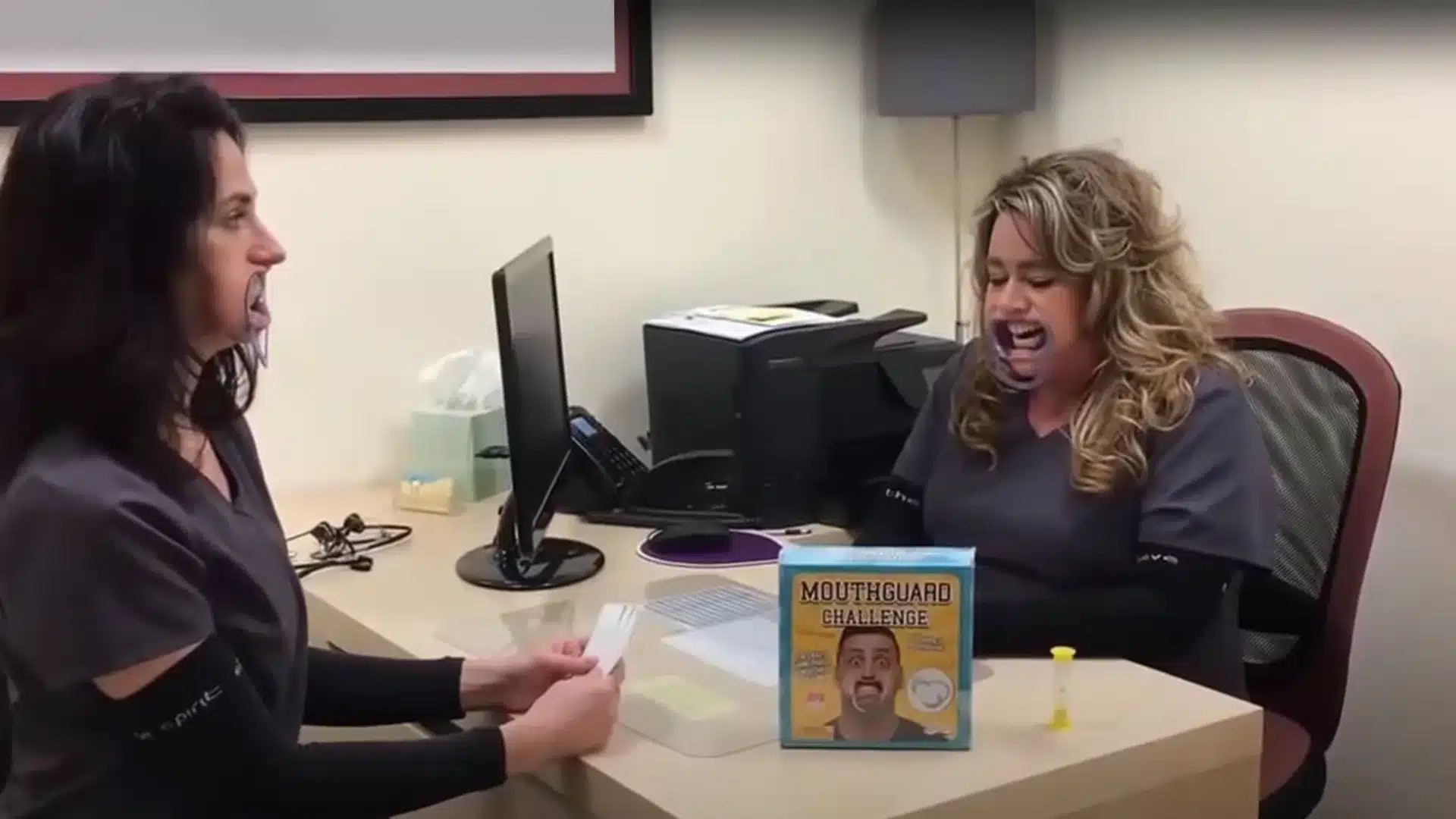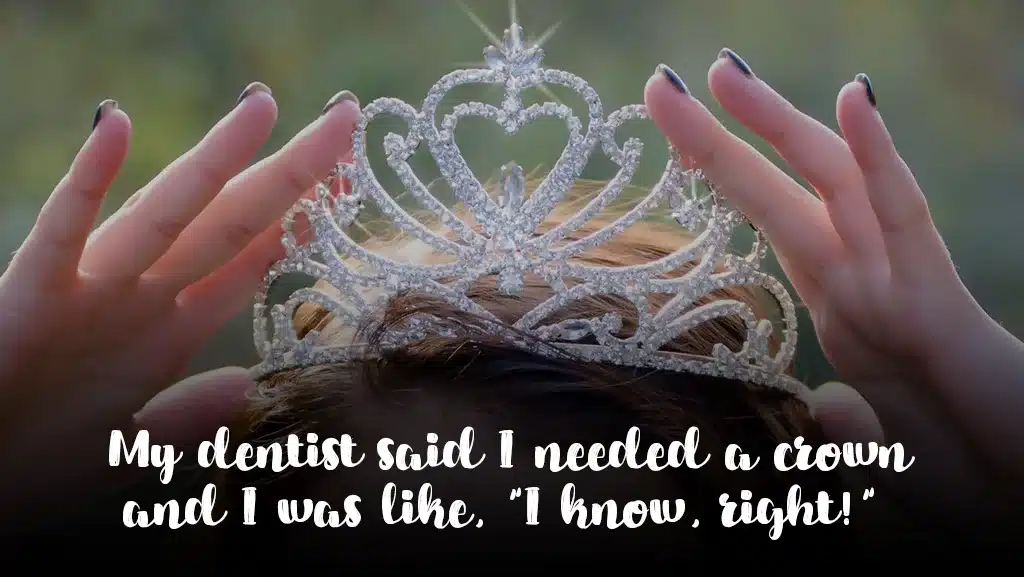Hello Tooth Fans!
Have you ever heard the sound of someone grinding their teeth?
It’s one of those noises that makes your hair stand on end and sends chills up your spine! It’s no wonder the Bible depicts Hell as containing “wailing and gnashing of teeth.” Most of the time when I hear it, it’s a child doing it on purpose because they know it gets a rise out of the adults in the room.
If you’ve never heard it before, consider yourself lucky. It’s pretty excruciating, like fingernails on a chalkboard.
Dr. Drews has written about this topic several times over the years, mentioning the grinders and teeth clenchers of the world in Do I Grind My Teeth? followed by another post where he talked about ways to reduce stress as a common cause of bruxism. He also talked about the affects of bruxism and teeth grinding and mentioned bite splint therapy in this holiday-inspired post. Makes sense, the holidays can certainly be stressful.
The grinding and gnashing and clenching of teeth during the day is referred to as Awake Bruxism (AB). All that stressful daytime grinding is a bit easier to diagnose because patients are typically aware that they’re doing it . . . but I want to focus specifically on Sleep Bruxism.
The grinding and gnashing and clenching of teeth during the night is referred to as Nocturnal Bruxism, or Sleep Bruxism (SB). Some people have to listen to that spine-tingling tooth grinding sound when they’re trying to sleep because their spouse or child is experiencing sleep bruxism.
While sleeping partner complaints is one of the most accurate ways of diagnosing a patient with nocturnal bruxism, I don’t often have the benefit of interviewing my patient’s significant other at my initial examination, nor does everyone make such drastic sounds when they grind their teeth at night.
Oftentimes when I ask a patient if they clench or grind their teeth they’ll deny it, not because they’re trying to put one over on me, but because they simply aren’t aware that they’re doing it. After all, they’re asleep! We can do some major damage to our teeth, soft tissue, and bone structure while we’re sleeping, without even being aware of it (that is, until someone tells us about it).
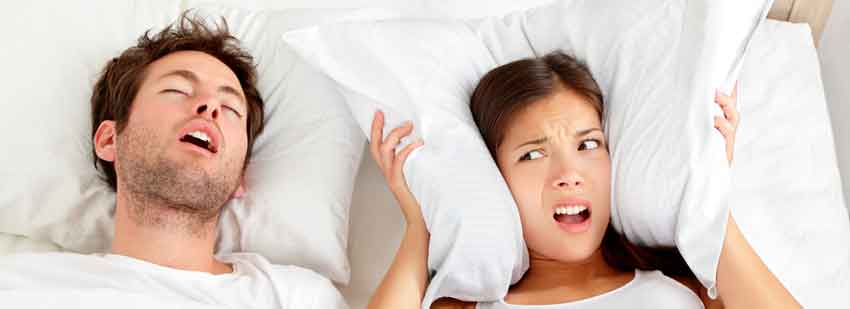
How Common Is Sleep Bruxism?
As you might imagine, there are no hard and fast statistics on the number of people who grind their teeth in their sleep because many of us don’t even realize we’re doing it and it can appear and disappear throughout the course of a lifetime.
- According to this study in the Journal of Conservative Dentistry, the prevalence of AB in adults was reported to range from 22.1% to 31% while that of “frequent” SB was more consistent at 13%.
- According to this study funded by the Canadian Institute for Health Research (CIHR), sleep bruxism’s prevalence ranges from 5% to 8% in the general population and tends to decrease with age.
I think it’s safe to say that even more than 31 percent of the human population experiences some form of teeth clenching and grinding activity, while awake or while asleep, at some point in their lives. And it’s also likely that the number of sleep bruxers topples over 13% as well.
Signs & Symptoms of Sleep Bruxism
The repetitive force of your teeth grinding against each other causes incredible wear and tear on tooth enamel, eventually exposing the inner (dentin) layer. Unfortunately, once that layer is exposed, the wear and tear accelerates.
Bruxers tend to have differing degrees of signs such as:
- worn tooth structure, potentially even damage to dental work, cracks or fractures
- increased tooth sensitivity
- tenderness of the facial muscles
- jaw soreness
- dull headaches
- ear aches
Patients who have symptoms of bruxism will report pain, particularly in their muscles of mastication (the masseter, temporalis, medial and lateral pyerydoids). In laymen’s terms, these are your cheek muscle, the muscle near your temples, and two other internal muscles next to your jaw joint.
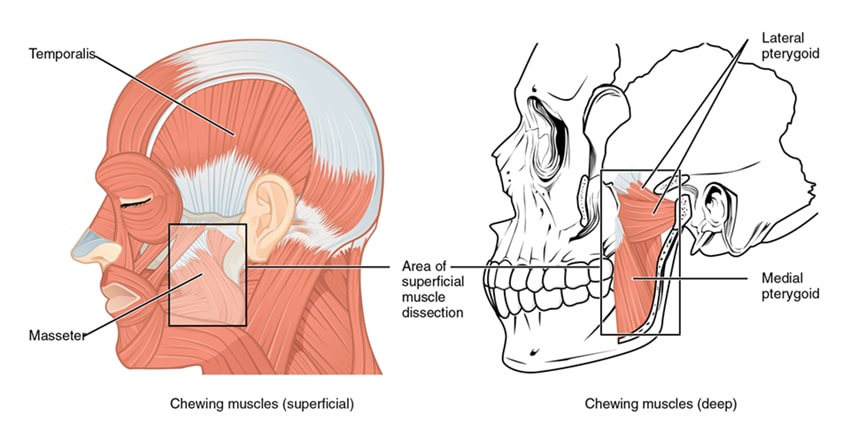
By OpenStax [CC BY 4.0], via Wikimedia Commons
Additionally people can report symptoms of popping or pain in their jaw joint itself, the temporomandibular joint (TMJ). As dentists, we always chuckle a little when people say they “have TMJ.” The joke is, “Yes, I do too. I have two of them. We all do.”
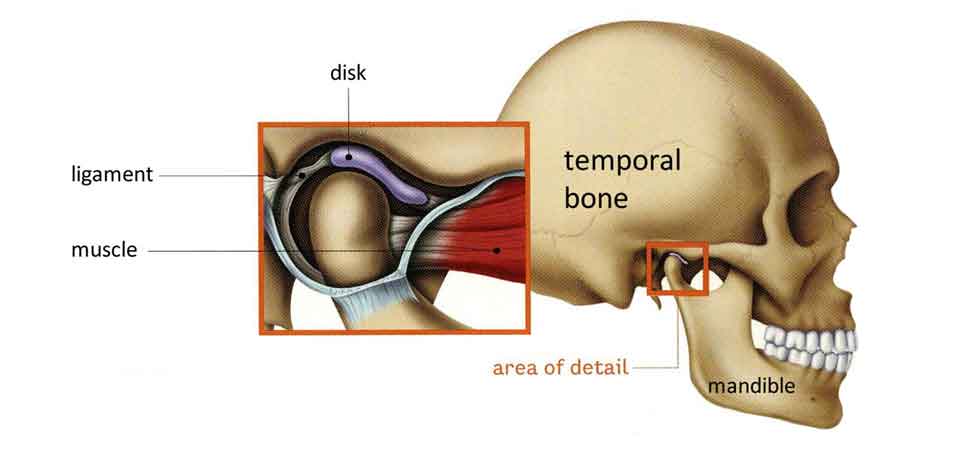
So if you’re experiencing pain in the joint of your jaw itself, the more accurate description is to say “I have TMD” or temperomandibular disorder. Yes, many dentists are smart asses, myself and Dr. Drews included. But we’re also big on educating patients to be as informed as possible, and knowing that you may be suffering from TMD (the actual disorder) is better than thinking you may be suffering from TMJ (the name of the joint).
Grinding your teeth at night can also result in tooth pain, since the periodontal ligament connecting each tooth the the bone can become stressed during the process and fire pain signals as a result. Additionally, a patient may come in because teeth (or restorations) are chipping or even breaking as a result of this process.
Some patients do not have symptoms, that they are aware of, which is why the condition is also said to be asymptomatic (without symptoms). Even when a patient isn’t aware of sleep bruxism, they often show signs. Evidence of bruxism that we see in the office include excessive wear patterns (flattening) most noticeable usually in the canine region and gum recession with scooped out patterns of the root surface, which we term “abfractions.”
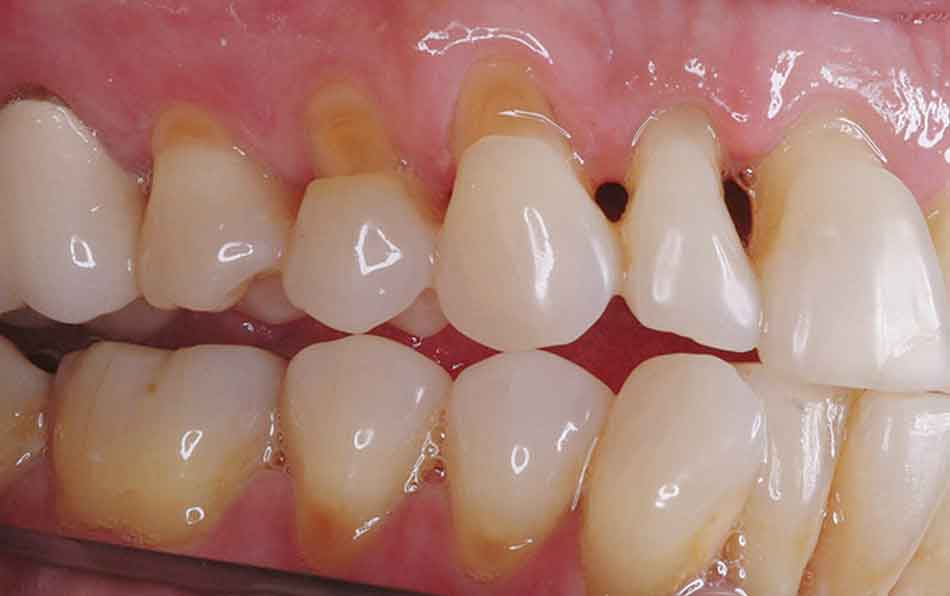
Additionally, there is a correlation between nocturnal bruxism and bony exostoses like mandibular tori. This is extra bone that develops on the inside of your jaw.
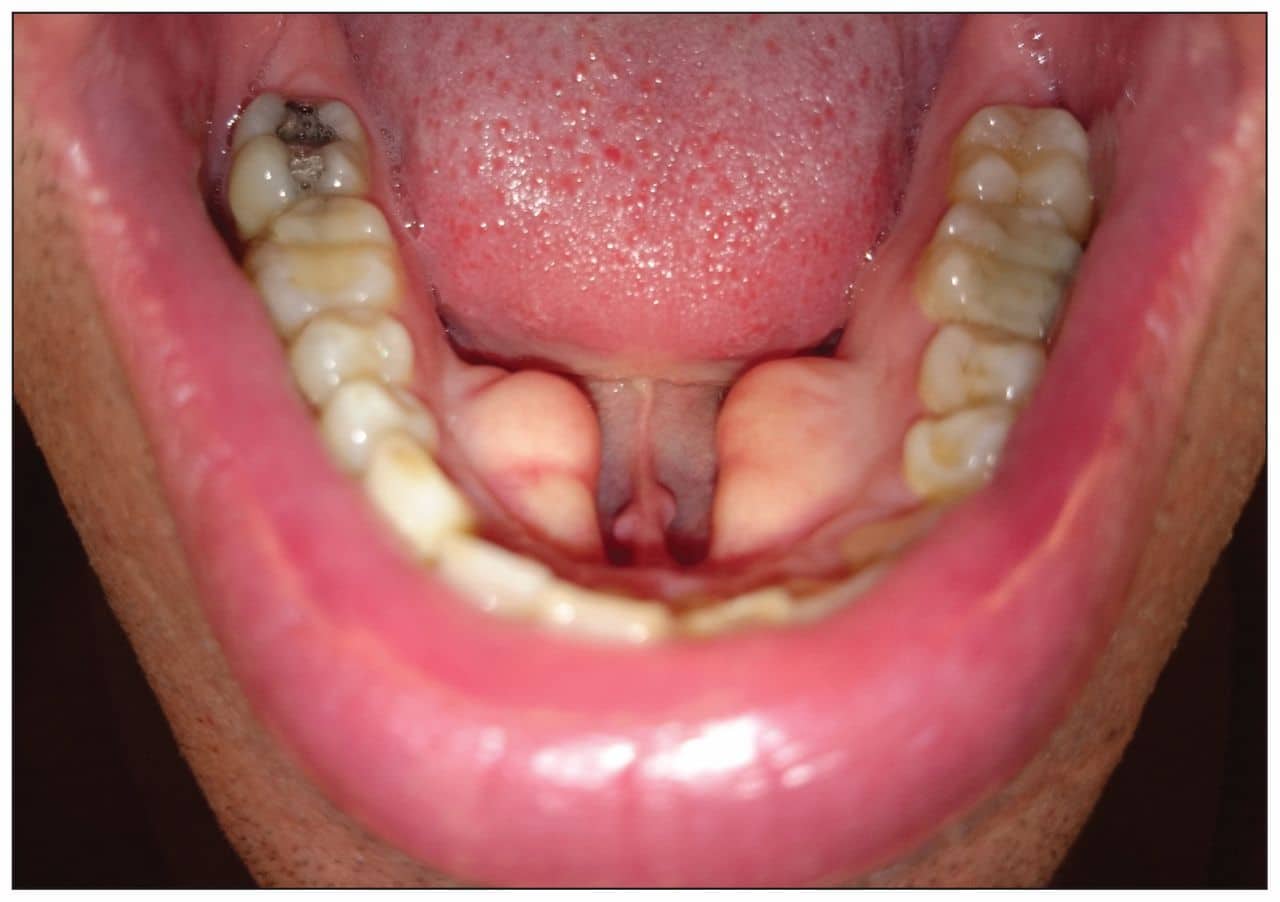
If you have them, you know what they are because they make taking dental x-rays a very challenging experience!
Why Do Some People Grind Their Teeth?
For years we’ve been researching this subject with a variety of answers. The most common answer has always been: stress.
Honestly, what is there that ISN’T caused by stress? Headaches, tummy aches, grinding teeth – you name it, stress is a contributor. Like anything else, however, it’s not universal. Not all people who are stressed grind their teeth, and not all bruxers are stressed.
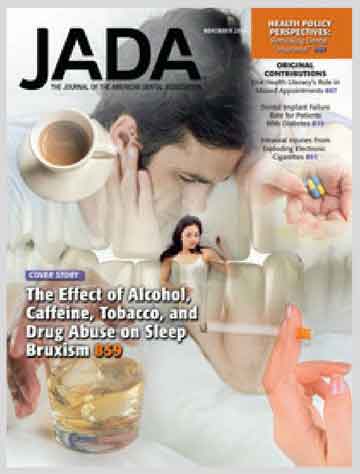
Ironically, some of the medications used to treat stress, namely antidepressants like SSRIs (selective serotonin reuptake inhibitors like Zoloft and Prozac), cause bruxism as a side effect.
Smoking, drug use, and alcohol consumption all make you about twice as likely to grind your teeth as someone who abstains from these substances. Caffeine is a contributing factor as well. Basically, any artificial substance you use to avoid or mask your stress is going to increase your likelihood of succumbing to this stress related disorder. (Mindfulness, anyone?)
Sleep disordered breathing is emerging as a major cause of sleep bruxism, and this can be a serious issue depending on how far along the spectrum of sleep disorders a person is.
Consider the person who is snoring at night. Snoring, in an adult, can range from a mild annoyance, but one that still allows the snorer to reap the benefits of a restful sleep – to a disordered breathing pattern which does not allow for restful sleeping, leaving the person tired and restless in the morning – to a full out life or death problem where one stops breathing completely at night time upwards of 30 times in an hour!
As the person struggles to breathe at night, the body stiffens the airway and tooth grinding is a mechanism the body uses to stabilize said airway. As I always say, breathing is important, my friends; it brings oxygen to the teeth. (And the brain . . . I suppose that takes a bit of precedence, don’t you think?) Your teeth can become a casualty of war if the body needs to fight for its oxygen.
Sleep apnea may also be related to sleep bruxism, and evidence suggests that treating sleep apnea can help alleviate sleep bruxism. (I will be writing another blog post in the near future addressing obstructive sleep apnea, so stay tuned.)
How is Bruxism Treated?
There are complex issues here. We need to treat the effects of bruxism, but we also need to treat and potentially prevent the causes of bruxism.
Repairing Teeth & Easing Pain
Teeth which exhibit wear facets or abfraction lesions can be treated by placing tooth colored restorations called composites. Broken or chipped teeth can be treated similarly, or depending on severity, can require crowns or veneers.
For acute pain, NSAID pain relievers like Ibuprofen are effective at reducing inflammation in the muscles. In more severe cases, muscle relaxants are occassionally prescribed to relieve the spasms in the muscles of mastication. Warm, moist compresses on the joint and the musculature provides pain relief as well.
Splints: An Ounce of Prevention
A bruxism splint, most commonly referred to as a “night guard,” will be prescribed for treatment as well as prevention.
We recommend a custom fabricated hard acrylic splint which we design to orient your jaw properly in its excursive movements. A night guard does not always prevent you from grinding completely, but it ensures that when you do, you will be grinding against acrylic which is replaceable, rather than enamel, which is not. It’s designed to act like a mechanical muscle relaxer so it places less pressure on the joints and musculature when you do grind.
We take impressions and bite registration records in our office so our lab technician, Matt, can fabricate the guard to your exact measurements.
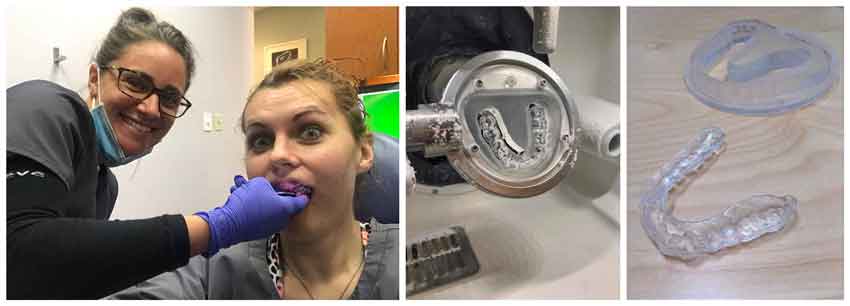
Over the counter night guards, while convenient due to their inexpensive nature, don’t always fit well and the soft material has been shown to promote an increase in grinding forces rather than a decrease.
Identifying & Eliminating the Cause
If bruxism is a response to stress, you’ll want to work out how you are managing the stress in your life. Mindfulness, prayer, and/or other relaxation activities are important to balance in your life, no matter how busy you seem to be. The importance of speaking to a counselor or psychologist can not be underestimated, especially in situations of severe stress or crisis.

It’s that old adage “an ounce of prevention is worth a pound of cure” . . . if you don’t take care of yourself, then your body will manifest its stress in all sorts of uncomfortable and inconvenient ways! Ain’t nobody got time for that!
A note about sleep disordered breathing . . .
If you tend to grind your teeth as a way to stabilize your airway, as in the cases of sleep disordered breathing like obstructive sleep apnea, the treatment can change. Airway management is key so you’ll often be prescribed either a CPAP machine (continuous positive air pressure), or a mandibular advancement device (MAD) which pulls your lower jaw forward to allow your airway to open in your sleep.
There are serious health risks with obstructive sleep apena, causing increases in blood pressure, risk of heart attack and stroke. If you snore all night, wake up exhausted even after sleeping your requisite 6-8 hours, and especially if you’re told you stop snoring suddenly in the night and then seem to work to catch up to breathing again, alert your physician and request a sleep study.
I will be writing two more articles in this series . . . one on snoring and sleep apnea, and another on grinding and snoring in children. Stay tuned for those, and as always, keep smiling!
Love & Gnashing of Teeth,

Kristie Lake, DMD



